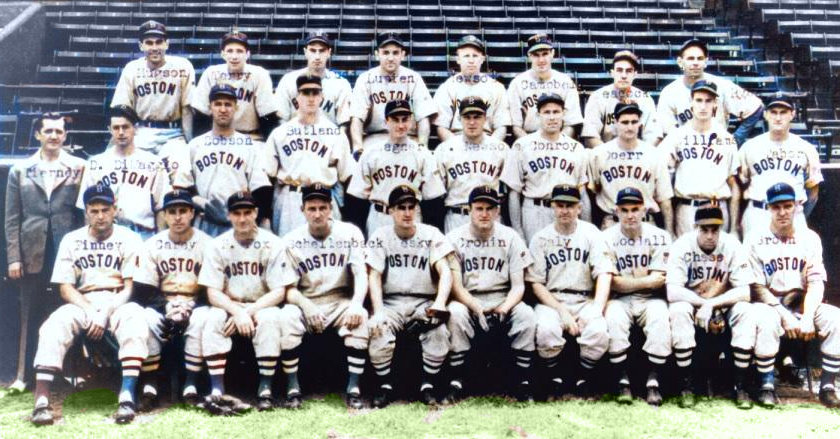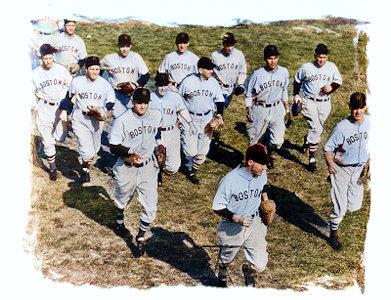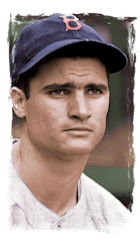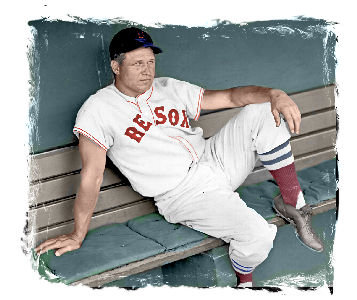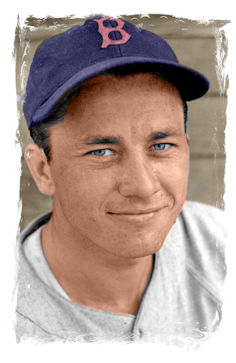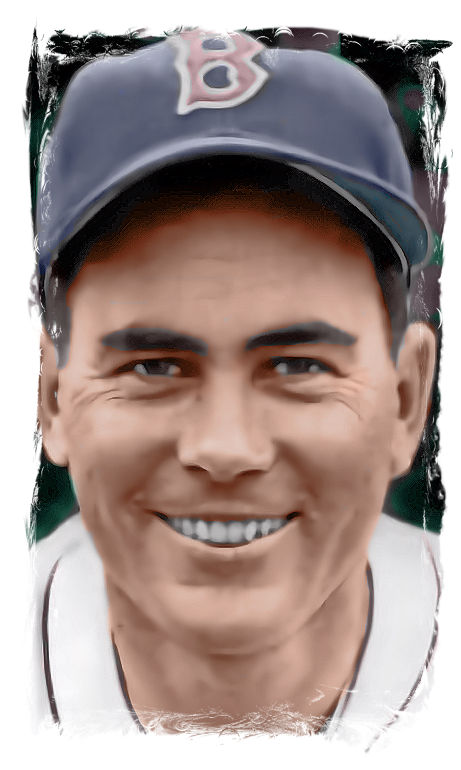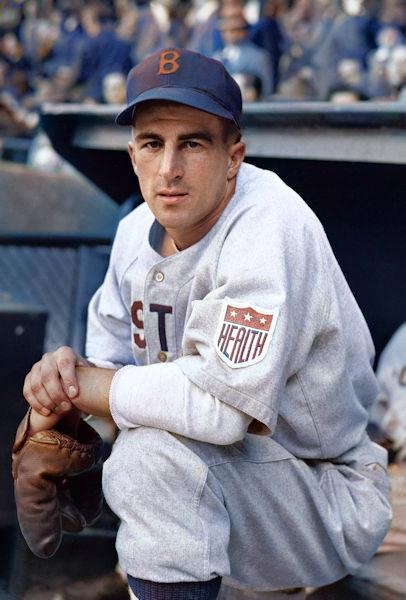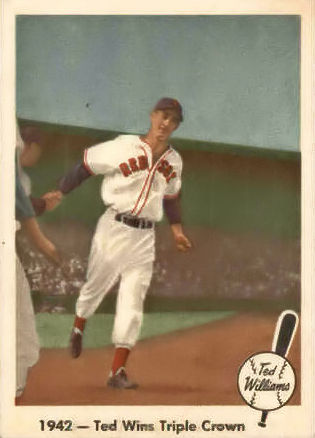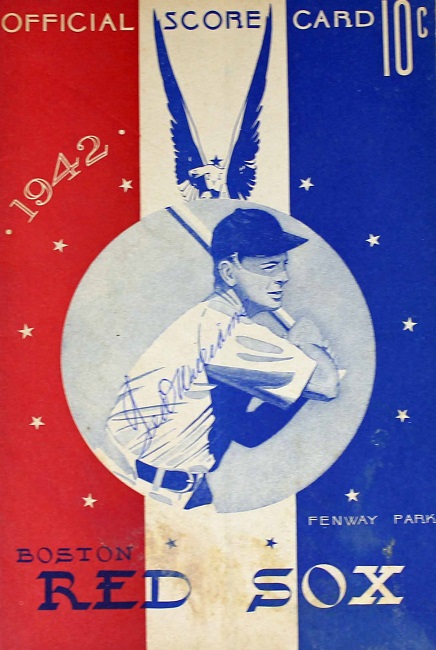On December 7, 1941, the Japanese attacked British and American holdings with near-simultaneous offenses in Southeast Asia and the Central Pacific. These included the attack on the American fleet at Pearl Harbor and in the Philippines, Guam, Wake Island, Malaya, Thailand, and Hong Kong, initiating the United States' entry into World War II. When the Americans entered the war in baseball's offseason, everyone wondered what was going to happen as spring training approached. In 1918, during World War I, it was determined that all draft-eligible men, employed in “non-essential” occupations, must apply for work directly related to the war, or gamble being called into military service. After the season many ballplayers were hired by shipyards as ringers, just to play on company teams and were assigned nominal duties, such as carrying blueprints or paint cans from one spot to another. In January, Commissioner Landis wrote a letter asking President Roosevelt what he wished would happen with the upcoming baseball season. Roosevelt thought that playing major league baseball would keep up the morale of the American public and decided the season should continue to be played. Immediately after the attack on Pearl Harbor, baseball held its winter meetings. The uncertainty of what would happen with the upcoming baseball season was on everyone's mind. On December 10th, pitcher Mace Brown was purchased from the Dodgers by the Red Sox. Three days later, Stan Spence and Jack Wilson were traded to Washington for Ken Chase and Johnny Welaj. The Red Sox were now a different team. They no longer could depend on Lefty Grove, Jimmie Foxx, and Joe Cronin to anchor the lineup. Frankie Pytlak, firstbaseman Al Flair, and pitchers Mickey Harris and Earl Johnson were lost to the military before spring training. Lefty Grove offered to not retire and play to help out the Sox. Tom Yawkey declined but offered him the job as pitching coach. Lefty politely refused his offer. The Red Sox did have some promising youngsters in pitchers Joe Dobson, Charlie Wagner and Tex Hughson. Then along came Johnny Pesky, the 1941 MVP of the American Association. Either he or Eddie Pelligrini was to replace Joe Cronin at shortstop. Pesky gave the Sox speed and defense and was a perfect fit to hit behind Dom DiMaggio and ahead of Bobby Doerr and Ted Williams. But with the outbreak of the war, Cronin was not certain that any of them would be with the team. For the Red Sox, many players had a deferment from the draft because they were married or were fathers over the age of twenty-five. Later draft boards re-examined the status of potential draftees. Ted Williams had a 3A status and was exempt because he was the sole supporter of his mother. He and others now had their exemption removed. As a result, Ted was ordered to report for a physical on January 8th in Minneapolis. Ted was outraged and hired a lawyer to fight his re-classification and he lost. The appeals board ruled that since Ted's salary was so much more than that of the average person, there was more than enough money available to care for his mother. Ted's lawyer sent an appeal to Washington got the reclassification was overturned. Ted Williams was exempt under the law, regardless of his salary, and still kept his deferment legally. When the news came out, Joe Cronin believed that the lawsuit would not sit well with the public and the fans would believe that the fix was in, with Ted being exempt because of his celebrity status. Meanwhile, Eddie Collins sent Ted a contract for the upcoming season and it was for $30K, a 60% raise over what he made in 1941. Ted signed his new contract and reported to spring training. In an exhibition game with the Cincinnati Reds in Sarasota, Ted received thunderous applause when he made his first plate appearance. In Tampa a few days later, he was swarmed by soldiers and signed hundreds of autographs. But in the press and in the letters he received, the criticism was harsh.
When the war broke out, Bobby Doerr was exempt because he and his wife Monica had a young son. He’d also been rejected for a perforated eardrum. As the war rolled on, the military needed more and more men and the pressures on seemingly-healthy athletes intensified. Johnny Peacock experienced some problems with his ankles and shins due to the soft and sandy soil in Sarasota. He shared catching duties with Bill Conroy getting just a bit more work. JJohnny expected he’d be off to war, and the day before he was to leave, he received the word that, because he had two children, he was exempt. In September 1941, in the major-league draft, the Red Sox had selected Conroy from Oakland. Conroy showed pretty well in spring training, winning a March 16th game over Washington with a 12th-inning single and homering in the 12th to beat the Cardinals on the 18th. Jimmie Foxx was beaned while barnstorming over the winter and started bailing out. Cronin told him that he would have to win the first base job from young Tony Lupien. Despite breaking a toe in spring training, Foxx outhit Lupien and started the season as the regular firstbaseman. Against Cincinnati in a spring exhibition game, Johnny Pesky hit a gapper against Johnny Vander Meer for a triple with a man on. After he got another hit, Joe Cronin told him the shortstop job was his. With the "Bataan Death March" underway in the Pacific, and the American military landing in Great Britain by the thousands, training to bomb Germany, plenty of men in uniform were at Fenway Park when the Sox played the Braves in an April 12th exhibition game. The cheers for Ted were thunderous, but his rabbit ears heard every negative barb thrown at him by fans who thought he was a draft dodger. When the season began, 61 major league players had gone off to war. Of the roughly 400 players on major league rosters, a quarter of them were rookies.
On opening day the cheers for Ted again were abundant when the Sox faced the Philadelphia A's on April 14th. With Dom DiMaggio on second and Johnny Pesky on first, Ted smacked a ball into the bleachers in his first at-bat. He collected two more hits, for five RBIs, to lead the Sox to an 8-3 victory. The next day, Joe Dobson just missed a shutout giving up a late-inning homer, beating the A's 3-1 on six hits. Dom DiMaggio and Jimmie Foxx each had three hits. The Sox completed a sweep of Philly with a 19-4 shellacking of the A's on April 16th. Jim Tabor and Pete Fox registered four hits each, while Ted and Skeeter Newsome, each had three. Ted was also able to bang out another home run. The Sox next headed off to Yankee Stadium, where 50,000 people including 2000 soldiers cheered for Ted Williams on April 17th. FDR had been correct. The country needed wartime baseball and players to cheer for, while the real heroes fought overseas. Oscar Judd dueled Tiny Bonham, giving up just five hits, and lost 1-0 on an unearned run. Yank Terry limited the Yankees to three hits in the second game of the series, winning 5 to 1. Ted and Skeeter Newsome each knocked out two hits. The Sox again beat the Yankees in the rubber game, 5 to 2. In six games thus far, Sox pitchers had given up a total of 12 runs. On April 18th, an air raid on Toyko was successfully carried out by American B-52 bombers under the command of Jimmy Doolittle. Dom DiMaggio's four singles, Pete Fox's three and Johnny Pesky's triple after two base hits, along with a double and a home run from Bobby Doerr, resulted in a 13-4 Sox win in Washington on April 22nd. On April 25th, Jimmie Foxx slugged his first homer of the year. Along with Bobby Doerr, who had three hits including two doubles, Joe Dobson held back the Yankees at Fenway, winning, 4 to 2. But the Sox did lose two of the three games they played with the Bronx Bombers. The Detroit Tigers were next to visit the Sox at Fenway and lost two of the three games they played. Foxx's second homer of the season, sharp Red Sox fielding, and fine pitching performance from Charlie Wagner gave the Sox a 6-1 decision in the first game on April 28th. Dom DiMaggio led the Red Sox in their second win over the Tigers the next day, on April 24th. He had three singles, two runs batted in, and a great catch at the center-field wall. Ted added a home run, Johnny Pesky three hits and Dick Newsome benefited, winning his third straight game, 8 to 3. With success after success in the Pacific, American patriotism was running high at a fever pitch. Ted Williams also got caught up in the sense of pride that was overtaking the country. On April 29th, following a loss to the Detroit Tigers at Fenway, Ted met Lieutenant Whitey Fuller, who urged him to take a look at the Navy's V-5 flight program. A week later, the two men met and drove to the Naval Air Station in Quincy, where he met numerous enlisted men and officers, talking baseball and aviation. After he climbed into the cockpit of a fighter plane Ted was hooked and signed an application to join the Navy.
On May 2nd, Ted belted a game-tying homer in the ninth inning and Bobby Doerr followed that with a double that scored the winning run for a come-from-behind 11-10 Red Sox victory over the St. Louis Browns.
The Sox next swept the Cleveland Indians, taking three straight at Fenway. In the last game, Ted went 3-for-3 with a homer and a double, but Bobby Doerr (.460 BA) was 3-for-4 in the first game, 3-for-3 in the second game, and 2-for-5 in the third game. Following that, Doerr clouted two home runs the next day on May 6th, against the visiting White Sox. He powered a 3 and 2 fastball into the left field screen in the eighth inning to tie the game at 1-1. In the tenth, he took a curve ball down the third base line and over the wall to give the Sox a 3 to 1 walk-off victory. From May 4th thru May 8th, the Japanese Navy engaged the naval forces of the United States and Australia in the Battle of the Coral Sea. With both sides having suffered heavy aircraft losses, the two forces eventually disengaged and left the area. Ted Williams had gone hitless in a game with the A's at Shibe Park on May 10th and was getting booed. Then in the ninth inning, he belted a two-run homer, with Johnny Pesky aboard, out of the park and onto the roof of one of the row houses across 20th Street. But the Sox lost 6 to 5 and a walk-off three-game sweep by the A's. Even though his teammates were not hitting, Jimmie Foxx had four hits in his last 11 at-bats. The Sox lost five straight before they finally won a game in St. Louis on May 16th. In that game, the Sox broke a 2-2 tie in the ninth inning, when Ted blasted a home run with Lou Finney on base, leading off the ninth inning, and winning 4 to 2. Tex Hughson pitched a great game, allowing the Browns just two hits. Bobby Doerr also homered, keeping his batting average at .416 Charlie Wagner picked up his fourth victory of the season, six-hitting the Tigers in Detroit on May 20th. That was because Jimmie Foxx broke a 2-2 tie in the sixth inning with a two-run blast into the left field stands with Ted on first leading Charlie and the Sox to a 4-2 win. The Sox concluded their road trip with an 8-3 win over the Indians in Cleveland. They had 12 hits including a double and homer by Ted, driving in four of the runs. Jim Tabor led the assault with four hits and Bobby Doerr (.411 BA) had three. They won only three of the seven games and returned home in 3rd place, five games out of first.
Ted Williams planned to take his physical and enlist immediately, still excited about becoming a naval aviator. On May 22nd, he reported to the Naval Aviation Cadet Selection Board in Boston without the knowledge of any of his teammates or the management of Red Sox. He passed his physical and the next day it was publicly announced that Ted had enlisted in the Navy. He was able to make an arrangement with the Navy allowing him to finish out the season and meanwhile take the necessary classes to become a Naval aviator. Immediately, the newspapers who had critisized him, and the public were now admiring fans. On May 24th, the Sox split a doubleheader with the A's at Fenway. They lost the opener but won the second game 6 to 5, in a game that was ended after eight innings. Joe Cronin who made his first appearance of the season, in relief of the injured Johnny Pesky at shortstop, doubled and homered. Down 5-2 going into the last inning, the Sox scored four runs in the eighth to win 6 to 5. After three straight walks and two outs in the eighth, Bobby Doerr singled in the winning runs. After losing two to the Yankees in New York, the Sox traveled down to Washington and bombed the Nats, 10-1 on May 27th. Oscar Judd pitched a great game, winning 6 to 1. Pesky had three hits and brought home three runs. Tex Hughson pitched another fine game against the A's on May 29th, winning 10-2. He gave up three hits over the first eight innings he pitched. Ted had two home runs, driving in seven runs. Pesky also had a big game with three hits, two of which were doubles. The Red Sox grabbed a pair from the Washington Nationals, beating them 11 to 1 and 4 to 3 on May 31st. Lou Finney was the hero of the second game. He cut loose with a line-drive single when the Sox had the bases loaded for the fourth time in the game. The runs that he hammered home were the ones needed, first to tie the game and then to win it. By the end of May Johnny Pesky (.338 BA) had accumulated 55 hits, most of the infield variety. Much of the time he batted out bunts, moving Dom DiMaggio over from first to third.
In June, the German army stopped a major Soviet offensive and launched attacks in southern Russia to seize the oil fields of the Caucuses. They also split their forces to take the Soviet city of Stalingrad. Jimmie Foxx was still the fixture at first base at the start of the season and played well, batting above .300 thru the second week of May. But just as he was beginning to hit again a freak batting practice injury resulted in two broken ribs. After going 4-for-26 to finish the month, the Red Sox could see the writing on the wall. They put him on waivers on June 1st and he was claimed by the Chicago Cubs, who bought him for $10K. Foxx was the greatest right-handed hitter in Red Sox history. He held the Red Sox single-season record with 50 home runs until David Ortiz broke it with 54 in 2006. He held the Sox single-season record for total bases with 398 until Jim Rice broke it in 1978 with 406. He still holds the Red Sox single season season record with 171 RBIs made in 1938. For 13 straight years, he brought in 100 runs or more runs to tie an MLB record. Four times he led the American League in home runs and held the MLB record for consecutive walks (6). From 1936-1938 he averaged .325 BA, with an average of 40 homers and 133 RBIs over the three years. On June 7th, Bobby Doerr hit Ted Lyons' first pitch in the ninth-inning high into the left-field screen for a home run that tied the game. Jim Tabor took another fly ball into the screen on the first pitch to him, for a walkoff 3 to 2 victory in the second game of a doubleheader over the White Sox. From June 4th thru June 7th, the Americans defeated the Japanese at the Battle of Midway, inflicting devastating damage to the Imperial Navy. The Red Sox embarked on a nine-game winning streak that gained them only a game and a half in the standings, behind the powerful Yankees. But they gained a higher place in the American League, moving up from fourth place to second place, where they remained for the balance of the season.
Bobby Doerr had another memorable game on June 9th against the Browns at
Fenway. He went 4 for 4 with two singles, a double and a home run, leading
the Sox to a 7 to 4 conquest. The Sox overcame a five-run deficit in the second inning of the game on June 11th. By pecking away they eventually beat the Browns, 8 to 7, on a ninth inning walk-off base hit by Jim Tabor. On June 13th Bill Conroy drove in Doerr with the winning run in the bottom of the ninth (after striking out his first three times at bat). Pesky (.337 BA) had a perfect 5-for-5 afternoon. Tony Lupien scored the tying run and drove in the winning run in the first game of a doubleheader with the White Sox on June 14th. He was not done because in the second game, he broke up the game with an 11th inning base hit to win that game also. The Sox traveled to St. Louis, where Oscar Judd handcuffed the Browns, 4 to 2. He struck out ten, allowed six hits and it was the fifth straight against the Browns by the hose.
Charlie Wagner outdueled the White Sox and Eddie Smith, 1-0 in Chicago on June 19th, allowing six hits. The only run scored was an inside-the-park homer by Dom DiMaggio. Two days later Tex Hughson (6-2) shut out the White Sox, 7-0, in the second game of a doubleheader with the White Sox. He got in trouble in the first inning but got out of it and allowed just one hit throughout the remainder of the game and three in total. In Detroit, Bobby Doerr collected three hits while Ted, Jim Tabor and Oscar Judd slugged home runs in a 6 to 2 win over the Tigers on June 23rd. Ted's home run the next day was the only run Charlie Wagner needed, as he hurled his second shutout, another 1-0 decision, against the Tigers. This time he gave only three hits. Wagner (2.20 ERA) had given just two earned runs in his last four games. Dom pulled a line drive by Rudy York out of the left field grandstand, leaping over the wall to rob a homer, ultimately saving the game. After a successful 8-4 road trip, the Red Sox returned to Fenway Park, 5 1/2 games behind the Yankees in 2nd place and three games ahead of the third place Indians. Upon their return on June 30th, they swept the Washington Nationals in a doubleheader on June 30th, banging out 26 hits. The first game was won 9-8, as the Sox battled back from an early deficit to take the lead and hold it. Jim Tabor figured in no less than a half dozen runs. He collected a homer a double and a single in the first game. He drove in four runs and scored three himself. Ted Williams doubled and tripled in the first contest, and banged out a double and a pair of singles in the second match, which the Sox won 5 to 2. Tony Lupien slugged his first major league homer to top things off. Bobby Doerr (.344 BA) had four hits, including two doubles for his afternoon.
On July 1st, the Sox again played Washington in another doubleheader. A fan down the left field line got on Ted with rude insults. Ted responded finally by giving them the finger which increased their verbal abuse. In the fifth inning of the second game, Ted purposely began launching line drives into the left field stand. One accidentally bounced off the wall in fair territory, surprising Ted. He therefore was slow to get out of the box and barely made it to second base. An enraged Joe Cronin pulled him out of the game and fined him $250. The Sox swept both games, 3-2 in the first one and 5-2 in the second one, where Joe Dobson pitched a beauty, allowing five hits. Despite all the distractions with the draft controversy, Ted was batting .336 and leading the league with 17 home runs and 75 RBIs. The Sox had won 21 of their last 27 games to draw within three games of the Yankees. On July 4th, against the Yankees in the second game of a doubleheader at Yankee Stadium, Johnny Pesky got Tommy Henrich out using the hidden ball trick. It was the bottom of the eight and Henrich, with Buddy Hassett on first and Frankie Crosetti on second hit a drive down the right field line. Crosetti scored and Hassett got thrown out at home. Sox catcher Johnny Peacock, seeing that Henrich was breaking for second after Hassett's out, rifled the ball to Pesky at second. Henrich was safe and dusted himself off, starting to talk to the umpire Eddie Rommel as he did so. He started to take his lead and Pesky, who still had the ball, tagged him out. Henrich's hit had tied the game however and in the ninth, the Sox put it away. Finney walked, Ted doubled him home, scored himself on Tony Lupien's hit, and Lupien came home on a sac fly. The Sox won the game, 6 to 4, but lost the opener 6 to 3. Down in Washington, Joe Dobson shut out the Nats on five hits, 5 to 0. It was the second game of a doubleheader. The Sox lost the first game but Johnny Pesky (.336 BA) had four hits in five times up. Ted (.347 BA) was 4-for-8 in the two games. In 1942, there were two All-Star games. The American League won the traditional first game at the Polo Grounds, 3 to 1 on July 6th. Ted Williams, Bobby Doerr, Dom DiMaggio and Tex Hughson represented the Red Sox for the American League. Ted was the only member of the Red Sox to see action. He played the entire game in left field without a defensive chance. He singled to right in the third inning, his only hit in four times up. The next day the American League Stars were in Cleveland playing a second game that pitted the winning American League All-Stars against a team of major leaguers who were now in the Army and Navy. That team included Bob Feller, Hank Greenberg and Cecil Travis. Red Sox players in the Service All-Stars included Mickey Harris and Frankie Pytlak. Ted Williams had one hit and three free passes in the game. His one hit was a triple off Harris. Hughson pitched two innings and gave up one hit. Doerr didn't get a hit but played flawlessly in the field. Pytlak caught the last eight innings for the Service All Stars, but didn't get a hit. Red Sox farmhand from Louisville, Ernie Andres, who was a specialist at the Great Lakes Naval Air Station, got two of the servicemen's hits. The AL stars won again, 5-0. The two games raised $160K donated toward the war effort. On July 9th, Charlie Wagner again threw a great game, a 2-1 win against the Tigers, permitting just four hits in 11 innings. The game was won on a pinch-hit fly ball to left field by Joe Cronin with the bases loaded.
It was Hughson's turn the next day as he pitched and batted the Sox to
a 6-1 victory over the Tigers. He held Detroit to seven hits and hurled
shutout ball into the ninth inning. At the plate,
Tex had three hits. His
single in the second inning brought home a run and his double off the wall
in the fifth inning, scored two more.
The Bosox and the White Sox split a doubleheader on July 15th. Tex Hughson picked up his tenth win in the first game, which the Red Sox won, 10 to 1. Doerr had two singles and a double for the day but also turned in three miscues. Williams slugged his 16th homer, good enough to lead the league as did his 87 RBIs and .341 BA. Charlie Wagner pitched another gem where he got very little run support on July 17th and took a 1-1 tie into the 12th inning. Johnny Pesky led off the Sox 12th by beating out a bunt for a base hit. Dom DiMaggio had a 22-game hitting streak stopped when he sac-bunted him to second. White Sox catcher Tom Turner threw the ball into the dirt and couldn't get Johnny at second base. That set the stage for Ted Williams, who ended the game with a line drive off the left field wall, winning 2 to 1. After completing a losing 8-10 July homestand, the Red Sox (50-37) fell From three games out to ten games behind the Yankees, but still in second place. Wagner only allowed the White Sox four hits but lost in Chicago, 2-0 on July July 22nd. The Red Sox lost 2 of 3 in Chicago, winning the last game, 5-4. They had to battle from behind led by Dom DiMaggio, whose seventh inning triple, chased home two runs that were responsible for the win. On July 24th, in the first game of a doubleheader in St. Louis, Pete Fox and Johnny Pesky (.327 BA) homered to beat the Browns, 5 to 3. It was Pesky's first big league homer. The next day, July 25th, Tony Lupien was 5 for 6 with two doubles and a 10th inning triple, that allowed him to be brought home with the game-winning run when Bobby Doerr (.337 BA) singled. The Sox outlasted the Browns, 9 to 8. Doerr had three hits and drove in five runs. Dom had two triples and Ted homered. Hughson won his 11th game in Cleveland on July 27th, 8-5. Pesky drove across three runs and scored two himself. The Sox got the lead in the ninth, after getting three runs. Pesky's two-run triple into League Park's right field screen was responsible. Again in Cleveland, Tony Lupien's three-run double put the crusher on the Indians, 3 to 1 on July 28th. Ted added 13 points to his league-leading batting average of .350 over the past ten days. He drove in five runs to bring his leading total to 97 and swatted two homers to lead the league in that category also, with 22.
In Detroit, Tex Hughson won his sixth straight game, 7 to 6 on July 31st. Tony Lupien connected for a homer, a double and a single to pace the Sox attack. Down 7-6 going in the seventh inning the next day, the Sox drove in three runs on four straight hits, to beat the Tigers, 9 to 8. After losing a doubleheader to the Tigers on August 2nd, the Sox fell into third place, 13 games behind the Yankees. The Sox then returned home to Fenway. On August 7th, U.S. Marines and other allied forces landed on Guadalcanal, Tulagi and other Solomon Islands. The Japanese defenders were overwhelmed by the Allies and lost the islands as well as Henderson Airfield.
Hughson won again on
August 5th, shutting out the Philadelphia A's, 7-0, on three hits and
seven strikeouts. Only one base runner got past second base. He pitched to
only 27 men in the last eight innings.
Bill Butland was the
pitcher the next day and he too shut out the A's. The score was 2-0 and it
was his first complete game. He allowed just four hits. Lupien's 11th inning single drove in the deciding run against the New York Yankees at Yankee Stadium on August 11th, giving Hughson his eighth straight win. In doing so, Tex became the first American League pitcher to win fourteen games. On August 15th, the Boston Red Sox had just come off the road after splitting a pair against the Yankees. The Washington Nationals came to visit Fenway for a Saturday afternoon doubleheader. Tex pitched a fine game to win his fifteenth game, 2 to 1. Ted’s two-run homer in the third inning, proved the game-winner. It was the 22nd game-winning home run of his career, of the 106 he ultimately amassed. Ted got two more hits in the second game and Tony Lupien had three. The Sox and Nats battled through the ninth inning in an exciting contest. The Nats grabbed a 6-5 lead after their half of the ninth, but the Sox came back in the bottom of the ninth. Williams and Lupien singled and Lou Finney laced a triple that scored both of them for a 7 to 6 walk-off victory. The Sox swept a second doubleheader from Washington the next day on August 16th. The Sox won the opener, 6 to 4, as Ted was 3-for-3. The second game was a 10 to 3 laugher. Pesky and Lupien each had three hits and Ted (.352 BA) added another double to his day. On August 18th Pesky hit his second and last home run of the season. It came in the fifth inning at Fenway Park against the Yankees. It was a three run drive that put the Sox up 5-4. The Yanks tied the game and in the seventh with Dom DiMaggio on first, Pesky bunted him to third. Ted scored him with a base hit and Doerr scored Pesky with another hit to put the Sox ahead 7-5. The Yankees re-tied the game in the ninth sending it into extra innings. In the bottom of the tenth, Johnny Peacock led off with a double, and was run for by Pete Fox, who moved to third on a sac bunt. He scored the game winner on Dom's sac fly, 8 to 7. The Sox and Yanks split a doubleheader the next day. The Sox won the first game 6 to 4 on home runs, earning Tex Hughson his 16th win. Ted blasted his 26th and Jim Tabor had two homers and a double. Joe Dobson only gave up five hits but lost the second game, 2-1. Tabor's third homer in two days gave the Sox another win in the final game of the series with the Yankees on August 20th, 7 to 4. Even though the Red Sox took three of four from the Yankees and six of their last seven games, they still were 10 1/2 games behind New York. They finished the month by winning eight straight and ten of twelve to get to only pick up 2 1/2 in the standings, eight games behind. On August 23rd the German Army started the battle to take Stalingrad. The battle was marked by close fighting in an urban city and would be the deadliest battle to take place during World War II, going on until the following February. It is regarded as the turning point in the war, forcing the Germans to withdraw forces from Western Europe to replace their losses on the Eastern Front. The Sox moved down to Philadelphia to face the Athletics next. They piled up six runs in the first two innings of the opener on August 21st. Lupien had two singles and a triple to drive in four runs. Ted Williams accounted for another two runs in the 7 to 5 decision with a first inning triple, boosting his RBI total to 111. On August 22nd, Lou Finney had three hits in the first game of a doubleheader and Bobby Doerr homered, as part of an 11 to 3 win against the A's. The Sox had thirty hits for the two games, winning the second one, 11 to 5. Dom DiMaggio had three hits including a home run in the nitecap. Pesky hit five singles in five consecutive innings during the doubleheader. Two were at the end of the first game and the next three were at the start of the second game. No one was able to do that again until Rickey Henderson duplicated it in 1991. His were all in one game. Tex Hughson and Joe Dobson each shut out the Athletics, 2-0 and 7-0, in another doubleheader on August 23rd, to complete a five-game sweep. In the last half of the fifth inning of the second game, Ted Williams was pelted by fruit and refused by the fans. It was in response to Ted throwing his bat after whiffing on a Phil Marchildon fastball for the second time, having gone 0-for-5. Hughson (17-3, 2.48 ERA) in winning his 17th game, had won his last 11 straight games. While many of the ballplayers waited to get drafted, Dom DiMaggio fought to get into the military. He tried to enlist in the Navy but was told that his vision was an issue. Despite a 4-F classification, he finally was able to enlist on August 24th, as a coxswain in the Naval Reserve. With a rating of third class petty officer, he would begin his service after the season. The Red Sox maintained their drive to get back into the pennant race, by sweeping a doubleheader from the Cleveland Indians, 4 to 3 in 11 innings and 5 to 1, before a turnout of 18,965 fans on August 25th. The double victories were scored behind the excellent pitching of Ken Chase and Oscar Judd, giving the Red Sox a record of 14 wins in their last 15 games. Lupien and Joe Cronin helped Bill Butland and the Red Sox win their ninth straight game as well as their 15th in 16 starts, by a sore of 4-1 over the Indians on August 26th. Lupien singled with the bases loaded, giving the Sox a 2-1 lead in the third inning and Cronin singled with the bases loaded in the eighth. Joe Dobson threw a 4-0 shutout against the White Sox at Fenway on August 28th on four hits. Charlie Wagner followed that up with a 6-2 decision on six hits the next game. After losing the first game of a doubleheader with the Browns on August 30th, the Sox rallied in the second game to slug their way to a 12-6 victory on 18 hits. Pesky, Finney and Williams each had three hits in the game. Ted had five hits for the day raising his average to .344 Hughson became the first pitcher in the majors to win 18 games, beating the Browns, 8 to 6, on the final day of the month. The Sox put together a 23-9 record in August, but only gained four games on the Yankees in the standings, still in second place, eight games out. The terrific hitting of Ted Williams featured all the offensive support that was required by the pitching of Charlie Wagner and Joe Dobson on September 2nd. With five hits in eight trips, including his 28th homer of the year, that deadlocked the opener at 2 to 2 in the eighth inning, and a two bagger that cleared the bases in the seventh of the closing game, Ted figured in every Red Sox scoring opportunity but one. Bill Butland pitched the Red Sox to a 2-0 win over Detroit on September 3rd, for a series sweep. Dom's leadoff double set up the first run and Johnny Peacock's base hit with Doerr on second, accounted for the other run. Ted was on the mound as the Sox played the GIs at Camp Edwards before 10,000 soldiers on September 4th. He pitched and Mike Ryba caught him. The Sox won the game 3-2 when darkness ended the fun afternoon. Ted knocked out his 30th homer when the Sox resumed American League play on Sept 6th. It broke a 7-7 tie with the Philadelphia A's in the eighth inning and gave the Sox an 8 to 7 win. The Sox beat the Nationals in Washington on September 7th by a 9 to 7 score. The win came in the top of the ninth when Johnny Pesky sliced a double over third base. Ted was passed and Tony Lupien dropped down a bunt. Catcher Jake Early tried unsuccessfully to get Pesky at third to load the bases. Lou Finney's long fly ball scored Johnny, and Ted scored a second run on Bobby Doerr's grounder. Washington beat the Sox in the next game, 15-11. The Sox accumulated 17 hits with DiMaggio and Pesky racking up four apiece. The Red Sox battered the Indians, 15 to 2 in Cleveland on September 10th. Tony Lupien, who doubled with the bases loaded in the first inning, along with Doerr, batted in seven runs between them. Pesky (.339 BA) had three hits including two doubles in the next game. Ted also had three hits and drove in his 130th run as the Sox beat the tribe again, 8 to 6.
Hughson (19-6) and Butland (7-1) allowed the White Sox just one run over 18 innings in Chicago on September 13th, winning both ends of a doubleheader, 6 to 1 and 5 to 0. Tex won his 19th game in the second game, shutting out the White Sox. Butland was the winner in the opener, with Chicago getting their only run on an error by Skeeter Newsome. On September 16th, Pesky collected his 200th hit of the season off Johnny Niggeling of the Browns. Ted blasted his 33rd homer onto the roof of the right field stands and Hughson won his 20th game in St. Louis the next day. Doerr collected his 100th RBI and contributed a 422 ft triple to the base of the dead centerfield wall. Against the Yankees in New York, the Sox scored three runs in the top of the tenth inning, to break a tie game and win 9 to 6 on September 19th. A doubleheader was split with the Yankees the next day. Lou Finney singled home the tying and winning runs in the eighth inning of the second game, winning 3-2. In the series finale, Ted Williams homered in the ninth inning with Pesky on base to tie the game and Tony Lupien got the game-winning hit in the 11th inning, giving the Sox a 3-2 win. Hughson got his 21st win in the process. The final game of the season was a match between the Sox and Yankees at Fenway Park on September 27th. Among the crowd were 4293 boys and girls admitted for free for carting in 29,000 pounds of scrap metal for the war effort. The Sox beat the Yankees, 7 to 6 as Hughson struggled but got his 22nd win. It was the last time the fans in Boston would see Ted Williams, Dom DiMaggio and Johnny Pesky until 1946. The Red Sox (93-59) finished the season playing well enough to win in any league that did not include the Yankees. They had their best record since the 1915 Red Sox. They finished in second place for the fourth time in the past five years. Servicemen were given free admission to see the ball games and box scores quite often would note the paid attendance and how many military members were there also. Several times gate proceeds were donated to war relief and over $500K was collected in 1942.
Johnny Pesky’s career got off to an unparalleled start and could have propelled him into the Hall of Fame had World War II not pulled three prime years out. Pesky set a rookie record with 205 hits. Despite the need to balance baseball with naval training, Pesky finished the season with a .331 batting average, second only to Ted (.356 BA) in the American League. He had 22 sacrifice hits and just as many bunts that went for hits. He had 205 hits which was a Red Sox rookie record, later broken by Nomar Garciaparra in 1997. There was no “Rookie of the Year” award yet. That same year, The Sporting News named him the shortstop on its All-Star Major League team. He came in third in the AL MVP voting. At the end of the year, Tom Yawkey gave him a $5000 bonus, that in addition to his $4000 salary. That is why Johnny Pesky loved Yawkey. The bonus was for him and his wife because he knew Johnny was heading off to be in the Navy. Jim Tabor’s hitting and fielding dropped off. He was benched for a time because of a prolonged slump. He hit just .252 in 139 games, and all his power numbers were down: 12 home runs, 18 doubles, 2 triples, and 75 RBIs. He had just six stolen bases and was caught 13 times. In the field, he had 33 errors to lead all American League third sackers; his range, which had been a strength, was now diminishing. It appeared his hard living was catching up to him. After compiling just a .196 batting average for the Red Sox, Tony Lupien had a tepid beginning as the starting first baseman. He inauspiciously went 0 for 3 and 0 for 4 in his first two post-Foxx starts at first base. Lupien went on to produce a .290 average after Foxx had left the Red Sox, justifying the team’s confidence in him as the new Sox first baseman. Lou Finney hit .285 in 113 games for the Red Sox at the age of 31. He was particularly adept in night games, collecting 14 hits in 35 after-dark at-bats between 1939 and 1941. He applied for a chief specialist rating in the Navy at one point when the season ended. Dom DiMaggio earned his second All-Star selection, while on his way to hitting .286 with 110 runs scored, good for third in the league, 272 total bases, and 36 doubles.
Ted Williams won the Triple Crown in the American League in 1942, with 36 home runs, 137 RBIs, and a batting average of .356. His on-base percentage was .499. His 141 runs scored also led the league. But for the second year in a row, Ted came in second in MVP voting. Manager Joe Cronin, when he played, was mainly a utility infielder and pinch-hitter, batting .304 in 79 plate appearances. Skeeter Newsome got into only 29 games, though he hit .274. Pete Fox continued in his part-time role, playing in 77 games while hitting only .262, a new career low. Tex Hughson emerged as the ace of the Red Sox. He completed 22 of his 30 starts, his first start not having come until May 16th (after he again experienced arm troubles in the spring), an amazing number considering his final win total. His career-best 22 wins, against only six losses, led the American League and tied the Cardinals’ Mort Cooper for the major league lead. Hughson also led the league in complete games, innings (a career-high 281), and strikeouts (113). His ERA was an exceptional 2.59. He was named to The Sporting News Major League All-Star Team. Dick Newsome won his first four decisions and was described as “still the ace of the Red Sox pitching staff. After those first four wins, he lost his next three games. 1942 proved to be nearly as successful as his rookie year. He won eight games with 10 losses and a 5.01 ERA. He couldn’t get his sinker to sink as effectively. His loss of the sinker, at least, his failure to use it as well as the year before caused him to have his below-par campaign. Joe Dobson won 11, lost 9, and cut more than a full run off his ERA, bringing it down to 3.30. Charlie Wagner went 14-11 with a 3.29 ERA and after the season enlisted in the Navy as a second-class seaman.
|
